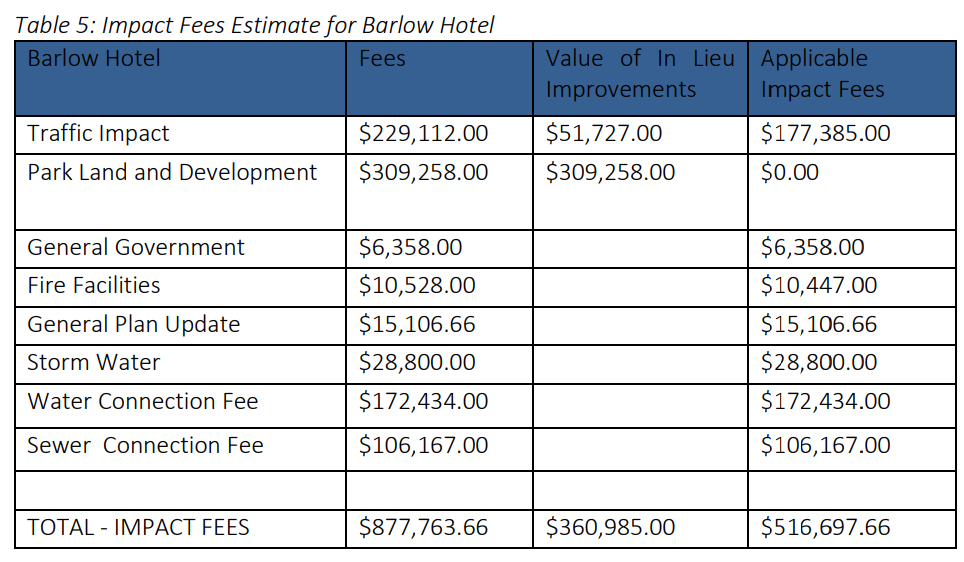A momentous council meeting in more ways than one
Council approves the Barlow development agreement, agrees to apply for creek naturalization grants, gives fee waivers to three local events, and releases City Manager Don Schwartz from his contract
While the big, late-night surprise of the evening was the departure of City Manager Don Schwartz, the council tackled several other substantial items at Tuesday night’s council meeting. They approved the Barlow development contract, agreed to apply for two creek naturalization grants, and gave fee waivers for several local events. They also heard a discussion on the concept of combining the Design Review Board and the Planning Commission.
Here’s the recap:
Mayor Stephen Zollman, Vice Mayor Jill McLewis, Councilmember Phill Carter, Councilmember Neysa Hinton, and Councilmember Sandra Maurer were all present for the April 15 Sebastopol City Council meeting.
Climate Action Committee Interviews
The council interviewed Steve Pierce, Emily Ocon, and Lila Newton for positions on the Climate Action Committee. They were all enthusiastically approved for those positions by the city council.
Consent Calendar
The consent calendar consists of items that are routine in nature or don’t require additional discussion, often because they’ve been discussed extensively at a previous council meeting.
The council unanimously approved the following consent calendar items:
Approval and adoption of a resolution to appoint NBS to prepare the annual 2025-26 Lighting Assessment District report. The cost is $8,000.
Approval of an amendment to the municipal code, changing the length of a garbage franchise contract to 15 years, up from 10 years.
Acceptance of the Sebastopol Pavement Management Program (PMP) Budget Operations Report and authorization for the city manager to certify the PMP by letter to the Metropolitan Transportation Commission by April 30, 2025.
Acceptance of receipt of process/next steps from the City Council Goals and Priority Workshop.
Presentation on merging the Planning Commission and Design Review Board
Last year former City Manager Don Schwartz suggested combining the Design Review Board (DRB) and the Planning Commission as a way to streamline the development process, making Sebastopol friendlier to businesses while saving about $20,000 in city staff time annually
The two committees have been discussing this merger concept. The DRB voted to support the merger as long as all members were architectural or design professionals, while the Planning Commission rejected the idea of a merger.
Community Development Director Emi Theriault gave a brief introduction to the issue and laid out three possible responses:
Join the two bodies, the composition of which would need to be reviewed at greater length for Council’s consideration.
Table a merger proposal and, instead, continue to hold joint meetings of DRB and Planning Commission for more complex development projects.
Revise the current order for major planning and development projects (which currently starts at the Planning Commission then goes to the City Council and then to Design Review). The new process would start with the Design Review Board then go before Planning Commission and then to the city council. (This is the order in most municipalities.)
The purpose of this presentation was informational-only, so no vote was taken that evening, but some of the council members had interesting takes on the issue.
Mayor Zollman liked Option 3—change the order—saying that the current process took too long and wasn’t developer-friendly.
Hinton suggested the city investigate a process, common in other cities, where each council member gets to nominate someone to the planning commission. She said those nominees often use it as a launch pad to run for city council.
McLewis made the entirely sensible suggestion that, in addition to listening to DRB and Planning Commission members, the city should talk to business people and developers who’ve gone through the planning and permitting process to see where the pain points are.
Maurer voiced her support for the DRB as a protector of Sebastopol’s small town charm and said she was leaning toward Option 2.
The issue will come back to the council at a later date.
Public hearing on the development agreement for the Barlow Hotel
The city council approved the development agreement for the Barlow Hotel 4 to 1. (Councilmember McLewis recused herself because her business is across the street from the property in question.)
A development agreement is a contract between the property owner and the city. Among other things, it establishes terms for the development of the property, such as building height, parking, site design, permitted uses and operating standards, impact fees and conditions of approval.
Adjunct Planner Jane Reilly, who is overseeing the Barlow Hotel project, laid out the council’s responsibilities in approving the project:
City staff recommended that the council approve the development agreement for the Barlow Hotel for the following reasons:
It is consistent with the Sebastopol General Plan and General Plan EIR.
It is consistent with uses allowed by zoning.
It will benefit downtown vitality and local businesses.
There is a significant anticipated increase in tax revenues to the city in the range of $1 million to $2 million annually.
In addition, the city will rake in some quite substantial development fees.
The Barlow Hotel architect Ian Murphy then gave a presentation on the Barlow Hotel. In brief, the 69,934-square-foot Barlow Hotel will be two and three stories, up to 55 feet in height. It will include up to 83 hotel rooms, a restaurant, roof-top bar and pool, spa, and retail space. As part of the development, the Barlow is also adding 305 total new parking spaces—73 spaces on site and 242 new spaces at the “batch plant” parking lot at 385 Morris Street.
For more details on the hotel, see our article on the Barlow presentation at the combined Design Review Board and Planning Commission meeting at the end of March.
Council and public comments focused on two main areas: Climate-related objections to the use of natural gas for heating and cooking (made by Lisa and Steve Pierce and Mayor Zollman) and the need for a redesign of the facade facing Sebastopol Avenue, which everyone agreed needed a little work. Questions about flooding were raised by several people, including Lynn Deedler, in public comment but not answered.
Mayor Zollman asked how Barlow owner Barney Aldridge was going to help businesses on Main Street, which are two to three blocks away from the Barlow Hotel. Aldridge replied that that was really the city’s business, suggesting that it needed to turn Main Street into a two-way street again.
Regular Agenda
Calder Creek Naturalization Grants
The California Urban Stream Partnership (CUSP) wants to submit two $1.8 million grants to Sonoma County Ag & Open Space and to the California Department of Water Resources, with the city of Sebastopol and CUSP as co-applicants. At this council meeting, representatives from CUSP were requesting the city’s permission to do so. The grants will pay for the daylighting of Calder Creek through part of Ives Park. (See this week’s article on this issue.)
Assuming that the full cost of this project will be paid by grants, there isn’t a lot of opposition to the opening of the creek through the portion of Ives Park that stretches from High Street to the weir. But this is just Phase One of a much larger plan to open the creek the full length of the park and through town to the laguna.
The current debate is between those who want to preserve the event space at the west end of the park (a group called Friends of Ives Park) and those who see Phase One as just the beginning of a longer-term project of daylighting the creek.
At the council meeting, that debate spilled into the open with public commenters Lisa and Steve Pierce arguing for what one of their friends called “Phase One and Done.” But it was fairly clear from council comments that a majority of the council was supportive of opening as much of the creek as possible.
“I think it’s important that this is the start of working on a larger project and getting Sebastopol to a place where it has a beautiful gem of a park in its city center. This is simply getting the grants underway where we can re-wild the creek,” Councilmember Phill Carter said.
In later comments, Council members Sandra Maurer and Neysa Hinton both supported opening the creek all the way through Ives Park, which would effectively cut the event space in half.
In other comments, Councilmember McLewis said she didn’t want to stall other improvements in Ives Park because of uncertainty about when the creek could be daylighted and where exactly it might go. Mayor Zollman felt the staff report didn’t provide enough information to make him comfortable with supporting the grant applications.
In the end, the council voted 4 to 1 (Zollman dissenting) to apply for the two grants.
Sending a representative to the Climate Directors Meeting
The Regional Climate Protection Authority (RCPA) holds bi-monthly meetings for sharing information and facilitating collaboration on climate action. Each city in the county can send a staff member to these meetings if they like.
It became clear as the discussion of the item wore on that this was really about a tussle between former City Manager Don Schwartz and the city council over the importance of meetings such as these. The RCPA asks that cities send staff with “decision-making” capability to these one-hour monthly Zoom meetings. Schwartz, who wanted to reserve Community Development Director Emi Theriault’s time for more important things, sent the city’s part-time associate planner to the last meeting.
Councilmember Naysa Hinton argued for the value of these meetings based on the opportunity to learn about available grants and the chance to collaborate with other local cities.
Councilmember McLewis was more skeptical, not because she doesn’t like the idea of climate protection, but because of limited staff time.
“There’s a finite amount of hours in a day…I mean, everything we do is one more hour, one more hour, then all of that adds up, and then what have we accomplished?” she said, echoing a previous public comment from Robert.
The final vote was 3 to 2 in favor, with McLewis and Zollman dissenting.
Fee waivers for local events
Three local organizations requested fee waivers from the city:
The Rotary Club requested a waiver of the $500 special event permit fee to use Ives Park for its centennial celebration on May 25. The city council voted unanimously to grant this waiver.
The Kiwanis requested a waiver of the $400 special event permit fee to use Ives Park for its centennial celebration on May 25. The city council voted unanimously to grant this waiver.
The Chamber of Commerce requested the waiver of special event permit fees, city staff time (mostly police) and materials for the Apple Blossom Festival and Parade in the amount of $14,620. The city council voted 4 to 1 (Zollman dissenting) to grant this waiver. Zollman expressed that he felt the Chamber hadn’t lived up to last year’s agreement to refund the city for these costs out of the proceeds of the festival. This ticked off Chamber of Commerce Director Myriah Volk, who, after the vote and during the final public comment period, noted that the chamber had indeed reimbursed the city for last year’s costs.
City Council cancels City Manager contract for “no cause”
At the end of the meeting, the council went into closed session, where they voted 3 to 2 (Zollman, McLewis and Carter in favor; Maurer and Hinton opposed) to release City Manager Don Schwartz from his contract for no cause. See our article from earlier this week on that decision.
You can watch a video of the April 15 Sebastopol City Council meeting here. The next Sebastopol City Council meeting is May 6, 6 pm, at the Sebastopol Youth Annex, 425 Morris St., Sebastopol.







Very full article. As I understand it, the city council has approved a 69,000 + square foot hotel that will put further strain on a sewage system that needs millions of dollars of deferred maintenance, put further burden on our underfunded police department, further burden on our fire department which we have just essentially outsourced, received a dismissive response from the developer (who has already proved he can’t follow City guidelines with his new restaurant) and made no provisions for increased traffic issues in an already congested area but is relying on the word of a man who has broken his promises in the past. What could go wrong?
It seems I did not receive today's article on sanctuary churches. Can you check my subscription?